Jim Pearsall
Reviews By Author
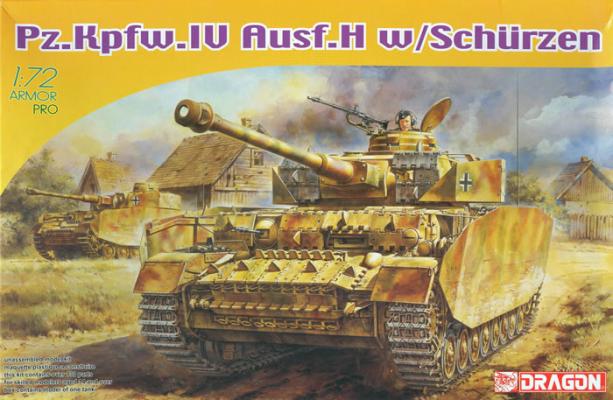
|
Pz. Kpfw.IV Ausf. H w/SchürzenPublished:
The AFVThe PanzerKampfWagen IV Ausf H was designed to be an improved version of earlier PZKw IVs. The 75mm KWK/40 L48 main gun was supposed to be the same 50mm gun used in the IV Ausf F, but the shock of discovering how hard it was to deal with the Russian T-34s and KV-1s necessitated the upgrade to a 75mm gun. The particular version in this kit has the standoff armor (Schűrzen = aprons). The standoff armor is to protect the hull from shaped-charge weapons like the bazooka or Panzerfaust. The boxart shows extra tracks carried on the front glacis plate, but these are not included in the kit. The KitThis is not a kit for most of the six to nine year-old crowd. The kit has a lot of little parts which makes for great detailing, but also a lot of fine work.… more |
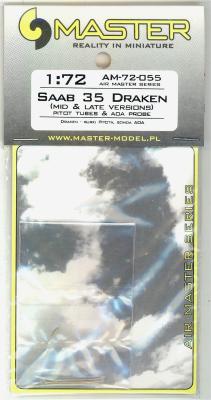
|
SAAB J35 Draken Pitot TubesPublished:
This accessory is for the Airfix, Hasegawa, and Heller Draken kits. The parts are replacement pitot tubes and an Angle of Attack sensor. The KitYou get three finely done brass parts in a plastic envelope, which is inside another plastic envelope. I found that the pitot tubes were in a separate tube-like pouch, with the AOA probe in a separated part of the inner plastic bag. I had to cut the bag twice to get the parts out. I liked the instruction sheet, it was simple, and showed you exactly where to put the pitots and the AOA. AssemblyThis particular model had the tail pitot intact, but the nose one had been broken off long ago. I cut off the tail pitot and drilled a small shallow hole. The nose pitot required a little cutting to get the… more |
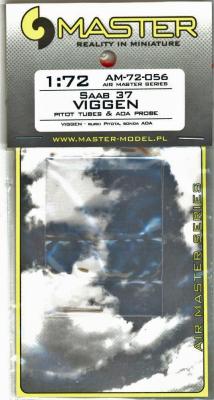
|
SAAB 37 Viggen - Pitot tubes & Angle Of Attack probePublished:
This accessory is designed to be used with the Airfix, Hasegawa, Heller or Matchbox kits. The parts are a replacement for the pitot tube, angle of attack probe (AOA) and secondary pitot, located on the vertical stabilizer. I used a Heller Viggen which was previously used for a paint mask review. The sensor and pitots are silver on this aircraft. I found a great shot of a Viggen on airliners.net which showed this color nicely. The KitYou get three finely done brass parts in a plastic envelope, which is inside another plastic envelope. This is done to prevent losing these tiny parts during shipping, handling or storage. AssemblyI painted the brass parts with Testors Aluminum Metalizer. While the paint was drying, I drilled the three holes, one in the… more |
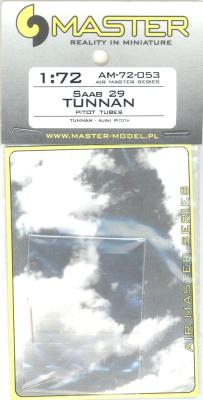
|
Saab J-29 Tunnan Pitot TubesPublished:
This accessory is for the Heller Tunnan kit. The parts are replacement pitot tubes. The KitYou get two finely done brass parts in a plastic envelope, which is inside another plastic envelope. Good plan – lost parts of this size would be a disaster, not to mention impossible to find. I liked the instruction sheet, it was simple, to the point, and uncluttered. AssemblyI used a Tunnan I built several years ago. It was great to have these brass pitots, as the plastic ones had been broken off soon after I did the model. I cut off the little projections where the pitots had been earlier and drilled tiny holes in the wing leading edge. I painted the brass parts with Testors Aluminum Metalizer. There is a difference between the… more |
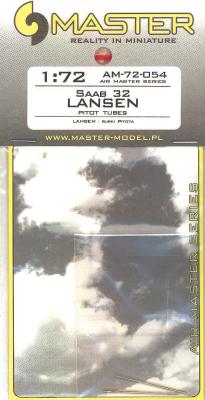
|
SAAB J32 Lansen Pitot TubesPublished:
This accessory is for the Heller Lansen kit. The part is a replacement pitot tube. The KitYou get one finely done brass part in a plastic envelope, which is inside another plastic envelope. Good plan, since losing parts of this size would be a disaster, not to mention impossible to find. I liked the instruction sheet, it was simple and showed you exactly where to put the pitot.
AssemblyI cut the remains of the old pitot off and drilled a hole in the wing where the old tube was. I painted the brass part with Testors Aluminum Metalizer. I put a bit of gel-type CA on the pitot and inserted it in the hole in the wing. I had enough time before the super glue set up to insure that the pitot was horizontal and straight, after… more |
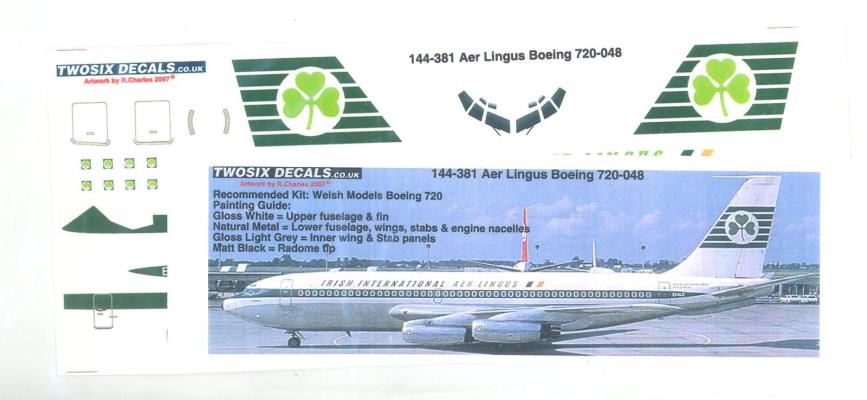
|
Boeing 720 - Aer Lingus MarkingsPublished:
The AircraftThe Boeing 720 is a “downsize” of the Boeing 707, with a smaller fuselage. It was used for short-haul routes where the 707 wasn’t economically feasible. It was built from 1958 to 1967. The 720 was a money-maker for Boeing because all of the development and testing was done on the 707. The Two Six decal set.You get markings for one of three Aer Lingus B-720s, EI-ALA, EI-ALB and EI-ALC. The decal sheet is complete down to the little shamrocks on each side of the jet intakes. These are laser printed decals, but they are separated on the backing sheet, so you don’t have to do a lot of trimming and cutting to get the markings off the sheet. InstructionsThe instructions are a little on the sparse side, but I found a great photo of… more |
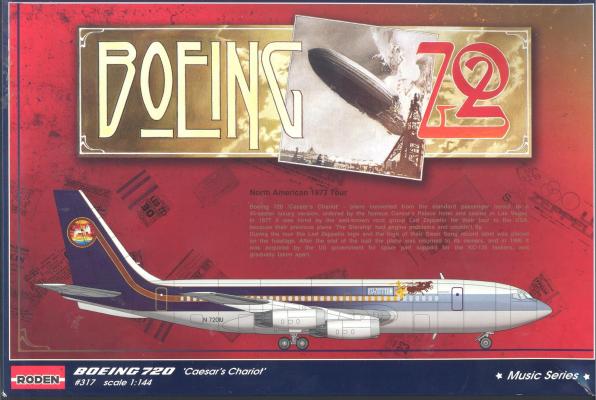
|
Boeing 720 “Caesar’s Chariot”Published:
The AircraftThe Boeing 720 was a direct development of the highly successful 707. The 720 had a shorter fuselage and was narrower, making it more cost effective for airlines on the shorter runs. 720s were profitable for Boeing because the development work had all been done with the 707. There were two basic versions of the 720, 720A and 720B. The A had P & W JT-3C turbojet engines, the B had JT-3D turbofans. Many As were upgraded to Bs through changing the engines. 720s were built from 1958 to 1967. The 720 in this kit was a 720B N7224U, owned by Caesar’s Palace in Las Vegas Nevada. The aircraft was called “Caesar’s Chariot”. It was leased to the rock group Led Zeppelin for their 1977 North American concert tour. The plane had a special paint job, with Zeppelin’… more |
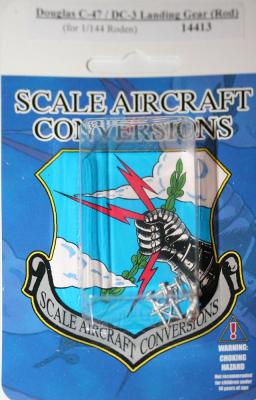
|
Douglas DC-3 Landing GearPublished:
The AircraftThe DC-3/C-47/Li-2/L2D1 (Tabby) were built in considerable numbers; the aircraft type has stayed around a LONG time, and they’ve been everywhere. The first DC-3 was built in 1935 as the Douglas Sleeper Transport, and there are a number of them still flying. A C-47 is the first aircraft I ever got airsick in, in 1968 on our way to Gulfport, Mississippi. The Scale Aircraft Conversions setThe SAC set for the DC-3 consists of 5 parts, all in white metal. There are two main gear legs, which use the kit wheels, two retraction arms, and a tailwheel assembly. These parts exactly match the Roden parts. PaintingA little detail painting to get the oleos brighter is all this needs. The DC-3 used metal gear legs, and the SAC parts look… more |
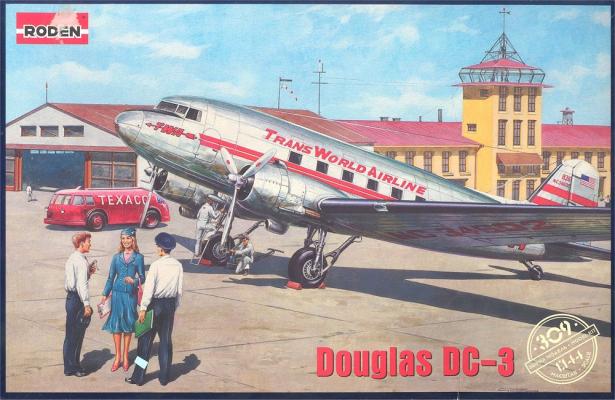
|
Douglas DC-3Published:
The AircraftThe DC-3 was a development of the earlier DC-1 and -2, with each one getting a little larger and faster. The DC-1 was a result of a request by TWA for a Douglas airliner, as United had the production of the Boeing 247 sewed up and TWA needed a suitable airliner. The original aircraft after the DC-2 was the DST, Douglas Sleeper Transport, built for American Airlines to replace their Curtiss Condors. The DST first flew on December 17, 1935, the 32nd anniversary of the Wright Brothers first flight. The huge advantage the DC-3 had was its greater speed and range. You could fly New York to LA in 17 hours, with 3 fuel stops. LA to New York was 15 hours due to prevailing winds. Previously, the practice was to fly passengers partway, put them on a train at… more |
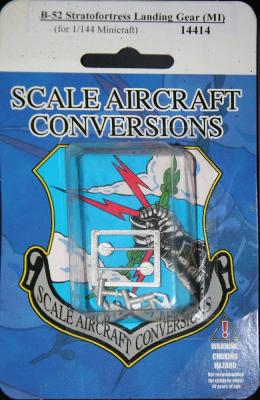
|
B-52G/H Landing GearPublished:
The AircraftThe B-52 has been flying longer than a lot of IPMS members have been building. It entered USAF service in 1955, and 85 of them are still in active inventory, with 9 in reserve. The combat-ready B-52Hs left are at Minot AFB in North Dakota and Barksdale AFB, Louisiana. The Scale Aircraft Conversions setThe SAC set for the B-52 consists of 4 identical main gear sets and two outrigger wheels and struts for the wings, all in white metal. The outriggers are cast with a protective sprue, which is a great idea since they’d be a little fragile. The main gear uses the kit wheels. PaintingThis was pretty simple. The main gear and the outriggers are painted white. I used Floquil Reefer White, which goes on nicely from the airbrush and… more |
